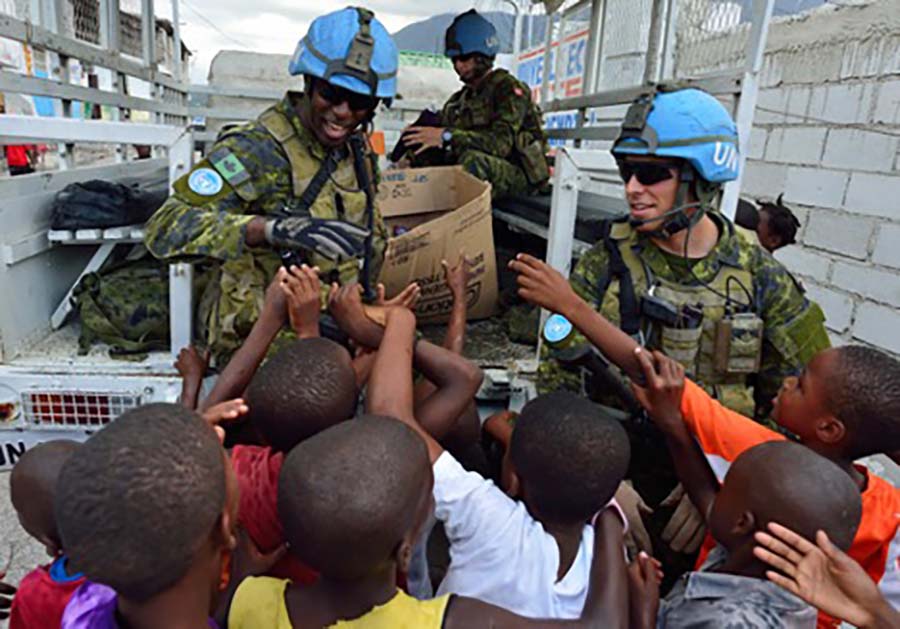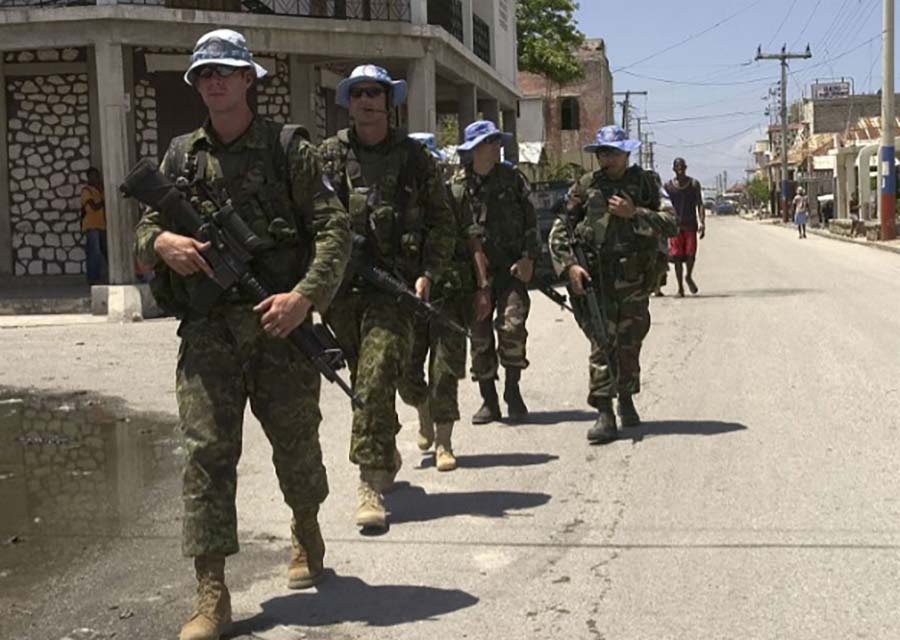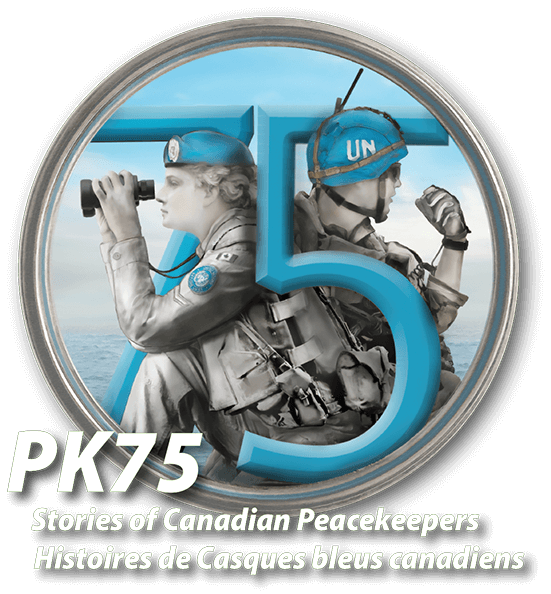Canadian Missions in Haiti
Canadian interest in Haiti is not new. After the Second World War, French-speaking Canadians became interested in this small Caribbean island that shares its territory to the east with the Dominican Republic. Indeed, a long dictatorship from 1957 to 1986 forced many Haitians to go into exile and to choose Canada, and in particular Québec, as a place to settle. As Haitians speak Creole and French, Canada was an attractive destination for them. Today, more than 160,000 Canadians are of Haitian origin.
Canada was quick to respond when the UN sent its first peacekeeping missions to help the young Haitian democracy, which was struggling with many problems after years of dictatorship: corruption, poverty, and crime. In 1989, for the first time, Canada authorised 426 Squadron to send several large transport aircraft (Hercules) to bring supplies to Port-au-Prince. This was a humanitarian operation that would be followed by other Canadian involvement from 1990 to 2017. A dozen Canadian peacekeepers were sent as members of the Haitian election observation group (ONUVEH) in 1990; this was Operation Héritage (each Canadian military operation bears a specific name). In 1993, the situation in Haiti worsened and a coup d'état threatened the entire population. The UN decided to send the first peacekeeping mission to Haiti: UNMIH (United Nations Mission in Haiti) from 1993 to 1996. The mission's first goal was to help the country modernise its army and police. Nearly 500 Canadian peacekeepers, civilian police, and military engineers were sent for Operation Cauldron. The operation was halted when armed civilians refused to allow the peacekeepers and UN ships into Port-au-Prince. The mission was dangerous, and the Canadians participated in a new temporary international force set up by the UN to impose peace and the presence of peacekeepers in Haiti (Operation Forward Action). By 1995, the situation had stabilized and UNMIH was able to resume its original work. An additional 500 Canadian peacekeepers were sent to Haiti to help rebuild the country (units and training for the Canadian air command). Operation Pivot provided important logistical support for the mission. Encouraged by the results of the mission, Canada sent 750 new peacekeepers in 1996 (Operation Standard). The participation of infantry, military police and intelligence personnel, engineers and even helicopters was a major effort for Canada. Canada's role was recognised with the appointment of Neil Pouliot (of the RCMP) as head of the mission's police force and Brigadier-General Pierre Daigle as the last Commander of UNAMAH and the subsequent one-year UNSMIH (United Nations Support Mission in Haiti).

This photo, taken in 2013, shows Corporal Marc-Daniel Benoit (left) and Sergeant David Lapalme (right) of the 2nd Battalion, Royal 22e Régiment, distributing supplies to children in Port-au-Prince, Haiti. Source: www.museedelaguerre.ca/apprendre/operation-hamlet
For four years, the supervision, training, and instruction of the Haitian police became the main tasks of the Canadian peacekeepers. Following this, in July 1997, the UN transformed UNSMIH into a transitional mission because the situation had to be stabilised and the professionalization of the Haitian police force had to be accelerated in the face of the criminality still present in Haiti. The UNTMIH (United Nations Transition Mission in Haiti) marked a turning point for Canadian aid: 230 civilian police officers (from the RCMP) were sent to Haiti, and 1200 Canadian peacekeepers accompanied them. The Canadian contingent was the largest in the mission and once again, the commander was a Canadian: Brigadier-General Robin Gagnon. From 1997 to 2000, it was within the framework of a police mission, the MIPONUH (United Nations Civilian Police Mission), that 300 Canadian police officers continued their work, supported by the Canadian army's Operation Compliment (with military vehicles, instructors, etc.).
The Canadian peacekeepers had just spent 10 years on the ground helping Haiti fight crime, training the police, and supporting the suffering Haitian population. In 2004, the government was overthrown, the President went into exile, and the violence led the UN to agree to send a major stabilization mission: MINUSTAH (United Nations Stabilization Mission in Haiti) until 2017. Initially, 500 Canadians participated in the interim emergency force sent a few months before the start of the mission to restore security and stability in Haiti (Operation Halo). They did not wear the blue helmet or beret because it was not a peacekeeping operation. However, in June 2004, they became blue helmets when they participated in MINUSTAH. The Canadian participation (Operation Hamlet) was important. Nearly 1,400 Canadian peacekeepers, RCMP, Québec, and French-speaking municipal police forces made a difference in the mission. Canadian troops from Operation Hamlet were also deployed and working to secure and stabilise various cities in Haiti. Although the situation remained dangerous and difficult, five years after the start of the mission, the Haitian police could count on 9,000 trained Haitian police officers, thanks to MINUSTAH (compared to 2,400 in 2004). Public security had improved, and kidnappings and murders decreased. Unfortunately, just as the work of the peacekeepers was beginning to show results, a terrible earthquake struck Haiti in January 2010. More than 230,000 people died, 300,000 were injured, cities were destroyed, and in the capital city of Port-au-Prince, three million people were affected out of four million inhabitants. The MINUSTAH headquarters was destroyed and a member of the RCMP; the acting commissioner of MINUSTAH operations, Superintendent Doug Coates, lost his life as did Sergeant Mark Gallagher, along with 25 international peacekeepers.

Canadian and Argentinean peacekeepers patrol in Les Gonaïves, Haiti. (Courtesy of Department of National Defence/Veterans Affairs Canada) Source: www.thecanadianencyclopedia.ca/fr/article/casque-bleus-canadiens-en-haiti
The mission was transformed into an emergency and humanitarian aid mission. Canada once again responded and launched Operation Hestia. More than 2,000 Canadian troops were mobilised to help the Haitian government, develop medical services, and provide engineering and security support. This was a joint task force, so our soldiers were not peacekeepers on this mission. MINUSTAH resumed in the spring of 2010, with Canadian police still very much involved. The environment became difficult, and the Canadian peacekeepers worked from 2013 with the Brazilian battalion. They had to patrol the hot spots, ensure crime control, and restore the confidence of the Haitian population, which was shocked by the sexual violence by some members of MINUSTAH and the spread of cholera by one of the MINUSTAH contingents. The knowledge of French, particularly by the 5th Mechanised Brigade of Valcartier and the Royal 22nd Regiment, is an asset for Canadian peacekeepers in this environment, one that is improving but still dangerous and criminalised. Making a difference is difficult. Yet, democratic elections took place in Haiti in 2017, the Haitian police have acquired better expertise, partly due to Canadian police officers, beginning in 2014–2015, providing training on sexual and gender-based violence and creating specific programmes with the Haitian police. After 13 years of effort, the UN closed MINUSTAH and decided to maintain a mission focused on improving Haitian justice, one of the weak points of local institutions. MINUJUSTH (United Nations Mission for Justice in Haiti) includes 25 Canadians working among the 1,725 international police officers to improve human rights and the judicial and penitentiary system. In 2019, as the political situation deteriorated and part of the Haitian population demanded the departure of the UN peacekeepers, the UN withdrew, leaving only a small political office in place (UNIHRO: United Nations Integrated Office in Haiti) in which Canadian police officers are still involved. The record of peacekeeping missions in Haiti is very mixed, but Canadian expertise and the desire to help and participate, one piece at a time, with the Haitian population in the reconstruction of their country, are constant values of the men and women who have served for over 30 years in Haiti.


